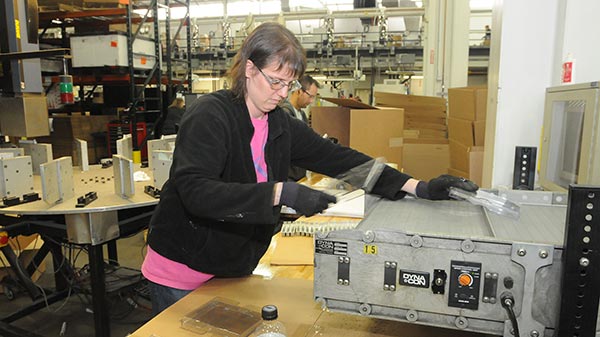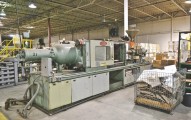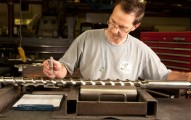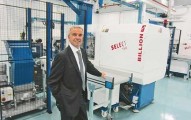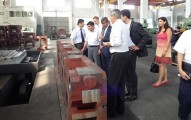People Skills Key to Success in Growing Plastics Industry
Spencer Wright got his start at Evco Plastics’ Oshkosh plant mowing the grass. Now, he manages the plant.
Wright said he’s the rule, not the exception, at the DeForest-based company that produces everything from tiny electrical connectors to all-terrain vehicle components.
“I’m one of the prototype Evco employees. We have plant managers that started packing boxes and have worked their way through,” Wright said.
Evco is just one company among many contributing to the Wisconsin plastics industry’s resurgence and the general growth of manufacturing in the state. Forward Wisconsin, which provides resources for businesses looking to open a new location, expand an existing business or start a new business, found that 36 percent of plastic products produced in the United States come from a 500-mile radius of Wisconsin.
According to the Society of the Plastics Industry, more than 900,000 people in the United States work in the plastics industry, and plastics development and production occurs in every state.
Senior Director of International Affairs and Trade Michael Taylor said Wisconsin’s plastics industry is largely focused on product manufacturing, as opposed to equipment manufacturing or resin developers, and demand for products and employees will only grow. Promotion of the opportunities available is one thing the industry as a whole must get better at quickly, Taylor said.
“In our industry, the skills gap is a factor right now, and it will only get bigger in 10 years,” he said. “Nobody went to schools and talked to you about good-paying jobs with a lot of opportunity for advancement in the plastics industry. It’s a problem. As the industry grows — and our domestic consumption is up higher than pre-recession — we’re going to need more skilled people than ever before.”
Industry growth
Wisconsin plastics manufacturers have weathered plenty of ups and downs over the last two decades. In 1991, the industry employed more than 30,000 people, according to Society of the Plastics Industry data. By 2000, that figure had grown to about 50,000 before two economic downturns hit Wisconsin manufacturers hard.
In 2013, the state’s plastics producers directly employed more than 35,000 people — ranking eighth among all states — and indirectly supported another 700,000 jobs in industries ranging from construction to health care and food service. Direct employment by plastics companies contributes almost $1.6 billion in wages to the state economy by Society of the Plastics Industry estimates.
That impact on the economy will continue as plastics manufacturers continue to grow through expansion and innovation.
In October, Michigan-based Ironwood Plastics Inc. announced a $19 million plant expansion in Two Rivers that would triple its workforce by creating 80 new jobs. Around the same time, Bemis Co.’s health care packaging subsidiary broke ground on a $25 million expansion that will help them add 160 jobs in Oshkosh.
Wright attributed the industry’s growth to flexibility, customer service and innovation.
“The industry is growing rapidly, and things are becoming more technical in nature,” Wright said. “You want to be the total solution for your customer. Our job is to understand where the plastics technology is.”
Willing to teach
The only thing as diverse as the goods the plastics industry produces is its workforce. Taylor said plastics companies need everyone from chemists and engineers to machine operators. Many jobs require a two-year degree, but the jobs are much more dynamic than most people think.
“They think plastics manufacturing is a boring, typical assembly-line job, but they have no idea what today’s advanced manufacturing facilities are like,” Taylor said. “And they don’t realize how much opportunity there is to move up even from the lowest levels. We’re a really dynamic, exciting industry. The opportunities will only increase.”
Wright said companies like Evco look for new employees with strong customer service and teamwork skills more than technical know-how and engineering experience. Such skillsets are helpful, Wright said, but Evco will teach the right person.
“We can train the right employee,” he said. “We hire for attitude and the ability to work on a team, to get along with others. Then we can train those individuals to understand the technical side of injection molding.”
In Oshkosh alone, Evco is hiring product inspectors and packers, machine operators, material handlers, electrical-mechanical setup and maintenance positions.
Bemis Co. is hiring for positions ranging from quality specialists and electrical technicians to setup technicians and converting operator/packagers.
Taylor, Society of the Plastics Industry’s director of international trade, talks to plastics company employees at business roundtables, and many of them echo Wright’s personal story as well as his assessment of the opportunities plastics companies can offer employees.
“I get a lot of anecdotes about people being with one company for 20 or 30 years,” Taylor said. “There’s a lot of lateral movement available (in the industry). And all it takes is that two-year degree. There is a need for specialties, too, but companies want to keep you, train you and encourage you to develop on your own.”

